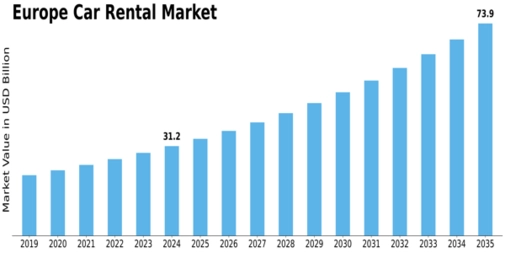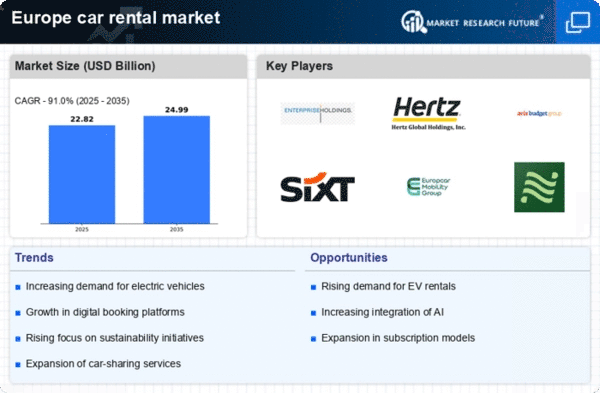Europe Car Rental Size
Europe Car Rental Market Growth Projections and Opportunities
The market factors influencing car rental in Europe are shaped by a combination of economic, regulatory, environmental, technological, and consumer-driven considerations. One key factor is the economic landscape, including travel trends, disposable income levels, and overall economic stability. The demand for car rentals in Europe is influenced by factors such as tourism patterns, business travel, and the willingness of consumers to spend on rental services. Economic fluctuations, particularly those related to global events and economic downturns, can impact the affordability and demand for car rental services across European markets.
Regulatory standards and policies also play a crucial role in the market dynamics of car rental in Europe. Each country within the European Union may have specific regulations regarding licensing, insurance, and environmental standards for rental vehicles. Compliance with these regulations is essential for car rental companies to operate legally and maintain a positive image in the market. Additionally, changes in regulations related to emissions and environmental impact may influence the types of vehicles available for rental and drive companies to adopt more sustainable practices.
Environmental considerations have become increasingly important in the car rental market in Europe. With a growing emphasis on sustainability and eco-friendly practices, consumers are seeking rental options that align with environmental consciousness. Car rental companies are responding by introducing electric and hybrid vehicles to their fleets, implementing green initiatives, and adopting practices that reduce the carbon footprint of their operations. Environmental factors are influencing consumer choices, and car rental companies that prioritize sustainability are positioned to attract a segment of the market that values eco-friendly options.
Technological advancements and innovations are transforming the car rental industry in Europe. The integration of digital platforms, mobile apps, and online reservation systems has streamlined the booking process, making it more convenient for consumers. Additionally, advanced technologies such as GPS navigation, keyless entry, and in-car connectivity enhance the overall rental experience. Car rental companies that invest in cutting-edge technologies are better positioned to meet consumer expectations and improve operational efficiency, influencing their competitiveness in the market.
Consumer preferences and behaviors are fundamental market factors influencing car rental in Europe. The shift towards shared mobility, including car-sharing and ride-hailing services, has impacted traditional car rental models. Consumers increasingly value flexibility, affordability, and seamless experiences. Car rental companies are adapting by offering a mix of rental options, including short-term and long-term rentals, as well as incorporating subscription models and loyalty programs to attract and retain customers. Understanding and responding to evolving consumer preferences are crucial for car rental companies to remain competitive in the European market.
Market competition and consolidation also shape the dynamics of car rental in Europe. The industry is characterized by both global players and local providers, contributing to a competitive landscape. Mergers, acquisitions, and partnerships within the car rental sector can influence market concentration and impact the choices available to consumers. Car rental companies that strategically position themselves within the competitive landscape, offer unique value propositions, and adapt to changing market conditions are better positioned for success.
The overall transportation infrastructure, including public transportation networks and the availability of alternative mobility solutions, is a market factor influencing car rental in Europe. Well-developed public transportation systems in certain European cities may impact the demand for short-term car rentals, especially for urban travel. Conversely, in regions with limited public transportation options, car rentals become a more essential and convenient choice for both local residents and tourists.
The COVID-19 pandemic has introduced unprecedented challenges and opportunities for the car rental industry in Europe. The impact of travel restrictions, lockdowns, and changes in consumer behavior have led to fluctuations in demand. Car rental companies have had to adapt their strategies, enhance cleaning and sanitation practices, and implement flexible booking policies to address the evolving needs and concerns of travelers during the pandemic.
The market factors of car rental in Europe are diverse and multifaceted, encompassing economic conditions, regulatory standards, environmental considerations, technological advancements, consumer preferences, competition, transportation infrastructure, and the evolving landscape shaped by the COVID-19 pandemic. Car rental companies that navigate these factors effectively, embrace sustainability, leverage technology, and align with changing consumer behaviors are better positioned to succeed in the dynamic and competitive European car rental market.


















Leave a Comment